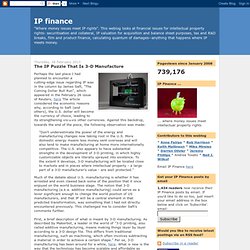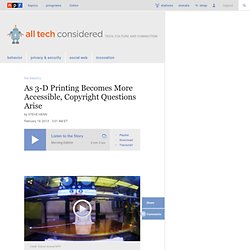

3D printing and Intellectual Property – why are they a misfit? – ipstrategy.com. By Joren De Wachter In my previous post at JorenDeWachter.com I explained how 3D printing affects the world of Intellectual Property (IP), and how this creates all kinds of problems for IP rights.

In this blog I will expand a little bit on why that is the case, and whether something can be done about it. 1. 3D. A 3D Printer’s Guide to Intellectual Property Rights. When objects are copied without permission, there is a distinct possibility of infringing third party rights.

Here is a guide to the various intellectual property rights which could well protect those objects. We explain what will and will not amount to infringement1. April 2013 Contents of this article Patents A patent gives the owner an exclusive and absolute right to exploit the invention covered by the patent. Products that may have patent protection. 3D printing will explode in 2014, thanks to the expiration of key patents. Here’s what’s holding back 3D printing, the technology that’s supposed to revolutionize manufacturing and countless other industries: patents.

In February 2014, key patents that currently prevent competition in the market for the most advanced and functional 3D printers will expire, says Duann Scott, design evangelist at 3D printing company Shapeways. These patents cover a technology known as “laser sintering,” the lowest-cost 3D printing technology. The intellectual property challenges from 3D printing. 3D print technology has been used for complex engineering design by specialist companies for over 15 years.

Greater availability and affordability of 3D printing has sparked a revolution, the implications of which are said by some to be limitless as all that is needed to produce a product is a printer, software, raw materials and a design. The IP Puzzle That Is 3-D Manufacture. Perhaps the last place I had planned to encounter a cutting-edge issue regarding IP was in the column by James Saft, "The Coming Dollar Bull Run", which appeared in the February 26 issue of Reuters, here The article considered the economic reasons why, according to Saft (and others), the U.S. dollar will become the currency of choice, leading to its strengthening vis-à-vis other currencies.

Against this backdrop, towards the end of the piece, the following observation was made: "Don't underestimate the power of the energy and manufacturing changes now taking root in the U.S. More domestic energy means less money sent overseas and will also tend to make manufacturing at home more internationally competitive. The U.S. also appears to have substantial strengths in the development of 3-D printing, in which highly customizable objects are literally sprayed into existence. Clayton Christensen’s Disruptive Innovation. As 3-D Printing Becomes More Accessible, Copyright Questions Arise : All Tech Considered. Many people think 3-D printing could help spark a manufacturing renaissance in the U.S. — even President Obama highlighted this technology in his State of the Union address last week.

But as 3-D printers and 3-D scanners get cheaper, this nascent industry could be roiled by battles over intellectual property. Not so long ago, a good 3-D scanner that could create accurate digital models of objects in the real world cost more than $10,000. Then, Microsoft released the Kinect — the video game controller that allows you to play games by just waving your hands. European Copyright Code - European Copyright Code. Preamble The Wittem Group Considering - that the establishment of a fully functioning market for copyright protected works in the European Union, as necessitated in particular by the Internet as the primary means of providing information and entertainment services across the Member States, requires common rules on copyright in the EU that reflect and integrate both the civil and common law traditions of copyright and authors’ right respectively;

3D Printing; Are We Near the Tipping Point? - Global Toy News. MakieLab In my last posting ("Last Week I Visited the Future... and its in 3D")I wrote about my trip to Shapeways, a company that is on the cutting edge of consumerist 3D printing.

Shapeways is not the only company in the business. 3D-printing technology creates complex legal issues, expert warnes. Naamkaartje « Lien Dierckx blogt. 'Het 3D-printen van sleutels en wapens: dit schreeuwt om nieuwe regelgeving' - Overheid 2.0. OPINIE - Stephan Grimmelikhuijsen − 24/10/12, 11:10 © ANP. 3D printing: new "disruptive technology" raises serious intellectual property questions. 3D printing: new "disruptive technology" raises serious intellectual property questions For years companies have employed 3D printing in various applications, most notably in the aerospace and automotive industries.

Until recently, however, the costs of 3D printing made individual consumer use prohibitively expensive. All that changed, however, after companies like MakerBot brought relatively inexpensive 3D printers to the market. This technology, while still relatively novel, has tremendous implications for manufacturers of all types of products. 3D technology can be used to produce virtually anything, ranging from toys and footwear to dental crowns and prosthetic limbs. Monitor: The PC all over again? Foldable Foldarap 3d printer launches a crowdfunding campaign on Ulule. Jul.7, 2012 Emmanuel Gilloz, the creator of the Foldarap 3d printer has launched a crowdfunding project on Ulule.

3D printing and law. 3D printing: The shape of things to come. 3D printing: The printed world. 3D Printing and the end of ownership - my plastic future. There is a lot of discussion online regarding the possible (inevitable?) Copyright/intellectual property/patent/legal fights around personal 3D printing. However, I’ve yet to see anything about a different fight that I have experienced several times now, so I figured I’d write about it and see what others think. Mine, mine, mine! As long as I’ve been printing on my Thing-o-Matic I’ve felt joy, wonder, and a bit of pride over the things I’ve been able to design and 3D print and hold in my hand in a matter of minutes.
The feelings are very similar to those I’ve experienced in the past when I’ve produced other types of “things” — ceramics, music, art, newspaper ads, and so forth; there’s something special in all of them. Legal battles loom as home 3D printing grows. The controversial website The Pirate Bay announced this week that it would begin hosting digital files for visitors to download and print out on their 3D printers. The site has coined a new word - "Physibles" - for data objects capable and feasible of becoming physical. "We believe that things like three-dimensional printers, scanners and such are just the first," the group wrote on its website. Kickstarter sued over 3D Systems' printer patent. 21 November 2012Last updated at 14:18 ET Formlabs's printer was developed by researchers working at Massachusetts Institute of Technology Crowd-funding website Kickstarter is being sued for its promotion of a new 3D printer.
More than 2,000 users contributed over $2.9m (£1.8m) to help Massachusetts-based Formlabs build the device. Clive Thompson on 3-D Printing's Legal Morass. Photo illustration: Andrew B. Myers Last winter, Thomas Valenty bought a MakerBot — an inexpensive 3-D printer that lets you quickly create plastic objects. His brother had some Imperial Guards from the tabletop game Warhammer, so Valenty decided to design a couple of his own Warhammer-style figurines: a two-legged war mecha and a tank. He tweaked the designs for a week until he was happy.
The Intellectual Property implications of low-cost 3D printing. Reference: Bradshaw, S., Bowyer, A. and Haufe, P., 2010. The Intellectual Property implications of low-cost 3D printing. ScriptEd, 7 (1), pp. 5-31. Related documents: Official URL: Abstract. Patent Could Cripple The 3D Printing Revolution. Intellectual Property Rights vs 3D Printing. In a post on Tech.pinions, reporter Steve Wildstrom writes his thoughts on the collision of 3D printing and intellectual property rights, which we've discussed previously on several occasions. All agree this will be a messy business, at least until we figure out the answers. Wildstrom thinks that it may be possible for 3D printer owners to be able to reproduce many commercial objects, simply because they are not specifically protected as thoroughly as other forms of work such as movies, books, processes or marks. Since the production and sale of replacement parts is a large and profitable business, he suggests that the replacement parts industry may try to constrain the abilities of 3D printer owners through the use of trademarks, DMCA and other existing legal means.
Time will tell, but regardless of the law, people who have making equipment will do one thing: Make Stuff. The Next Battle for Internet Freedom Could Be Over 3D Printing. Editor’s note: Rick Kelly (@_rickkelly) is an adjunct political science professor at BYU-Idaho and MBA student at UNC-Chapel Hill. Remember SOPA? In case you’ve forgotten already, earlier this year some Congressional legislators attempted to protect intellectual property through the Stop Online Piracy Act (SOPA). Will 3-D printing lead to a new wave of piracy?
3D Printing And Intellectual Property Rights Issues. This article was submitted by a one of our readers. Piracy, “Theft” and 3D Printing « Law, Technology & Arts Blog. By J.C. Lundberg, Blog Editor. Clone_Wars_3D_Printing.